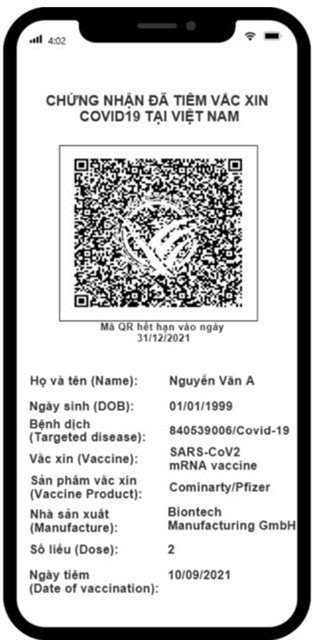February 25, 2022
HANOI — Vietnamese COVID-19 vaccine certificates are still not available two months after the Ministry of Health officially introduced the template forms and issuance procedures due to technical issues.
The Health Ministry on Wednesday sent a request to the Ministry of Information and Communications on expediting the process, especially with regards to digitally signing the certificates, to facilitate international travel and businesses of Vietnamese people.
On February 15-18, the Department for Information Technology under the Health Ministry worked with the Ministry of Information and Communications and the military-run telecom group Viettel to review and evaluate the digital signing procedures and concluded that the functions at this moment have not met the requirements and cannot be rolled out in time.
In the request, the Health Ministry also attached a document stating a list of requirements on the issuance of vaccine passports, including the necessity for the digital signatures to be available on JSON documents (currently the system allows only PDF files) and expansion of the ability to sign digitally beyond the system of Viettel to other operators/providers as well.
The Health Ministry also wants the “vaccine passports” to be displayed on the national COVID-19 app, PC-COVID (which is operated by the National Technology Centre for COVID-19 Prevention and Control, sponsored by Bkav, Viettel and VNPT), in synchronisation with the “vaccine passport” issuance certification system of the Health Ministry.
The COVID-19 vaccine certificates are to be issued for people who have received the primary course of one of eight types of COVID-19 vaccines licensed for use in Việt Nam by the Health Ministry: AstraZeneca’s Vaxzevria, Gamaleya Research Institute’s Sputnik V, Sinopharm’s Vero Cell Inactivated along with the manufactured-in-UAE version Hayat-Vax, Pfizer/BioNTech’s Comirnaty, Moderna’s Spikevax, Johnson & Johnson’s Janssen, and Cuba Centre for Genetic Engineering and Biotechnology (CIGB)’s Abdala.
The vaccine passports have 11 fields of information: name, date of birth, nationality, targeted disease, doses of vaccines received, date of vaccination, lot number of the vaccine batch, type of vaccine, vaccine product received, the vaccine manufacturer, and a code for the certification.
Information in the targeted disease, vaccine, vaccine product or manufacturer will be compatible with the values provided for in the World Health Organisation’s “COVID-19 vaccine tracker and landscape” and “Value sets for EU Digital COVID Certificates” issued by the European Union.

An example of Việt Nam’s COVID-19 vaccine passport, which the health ministry said will follow EU’s digital COVID-19 vaccine certificates. — Photo from the Ministry of Health
As of Tuesday, the Health Ministry has distributed a total of 200.4 million doses of COVID-19 vaccine (out of the 213.7 million doses received to date), with all purchase orders (using State budget) with vaccine manufacturers completed.
About 192.4 million have been administered. So far, including 175.03 million in adults (people aged 18 years and older) – 70.78 million first doses, 68.65 million second doses, 13.49 million additional doses, and 22.11 million booster doses.
Fifty-nine out of 63 localities in the country have achieved vaccination rates in adults higher than 90 per cent, with the four provinces – Thanh Hoá, Cao Bằng, Sơn La, and Bình Dương – reporting less than 90 per cent coverage.
Nearly 17 million doses have been administered in children aged 12-17 years old, including 8.71 million first doses and 8.25 million second doses.
Fifty-two out of 63 localities have inoculated 80-90 per cent of the population in this age group. — VNS


